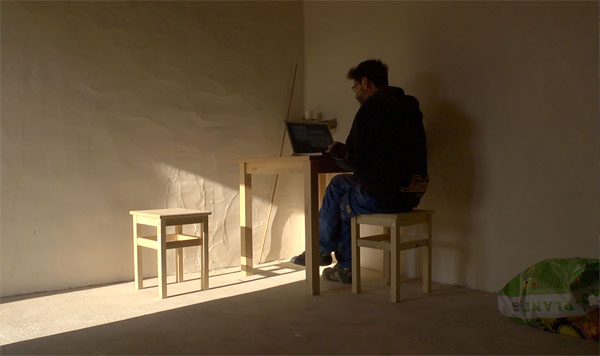One of the films screening in sidebars at the New York Film Festival that Vadim Rizov writes up in a piece for Filmmaker is Joaquim Pinto’s “pointedly rule-free” What Now? Remind Me. “Pinto’s a very cinephilic figure, his movie cross-indexed catnip for globally-minded viewers; there are stories about Portuguese director João César Monteiro and critic Serge Daney and passing moments spent with Rita Gomes, whose work has (I’m pretty sure) never had American exhibition. These reminiscences punctuate a year’s worth of sickbed memories: long stricken with HIV and Hepatitis C and documenting a year’s worth of experimental treatment, Pinto free-associates when he can’t do anything more. ‘Filming became just one more activity in our daily lives,’ he says of the video diary process, and here the cinephile’s gaze isn’t just an empty formalist indulgence but a way to sharpen the desire to live through heightened observation.”
At Gay City News, Steve Erickson suggests that What Now? Remind Me is “seemingly inspired by Jonas Mekas’s diary films and Chris Marker’s cinematic essays…. The film is about his experiences, in the broadest sense of the word—life in the rural Azores with his husband Nuno and a pack of dogs—and a wide range of musings about spirituality, history, and culture.” The film “transcends the narcissism that it could easily have fallen into, as Pinto winds up speaking for a generation of gay men whom he managed to outlive.”
Francisco Ferreira goes long on What Now? Remind Me for Cinema Scope, writing an essential primer on Pinto’s career and wide-ranging network of friends and collaborators, adding that, “in a way, he has been the heart of Portuguese cinema for most of the last 30 years.” Ferreira addresses “the film’s amazing polyphonic structure”; highlights the importance of a few documentary shorts Pinto’s made with Nuno as well as a 16th century book; and he writes:
There’s clearly an emotional and melancholic feel in the film through Pinto’s voiceover, but that melancholy becomes political when he points out during his treatment the shortcomings of a current health service still full of absurd, bureaucratic rules. Avoiding strict social realism and constructing its political message in a much more subtle way, it seems to me that What Now? Remind Me doesn’t have the pretension to speak in the name of a generation, nor does it desire to raise a flag in the fight against AIDS. It is also inconsistent to approach this film as some kind of terminal-care experience, in the manner of such powerful first-person testimonies as Hervé Guibert’s La pudeur ou l’impudeur (1992) or Jarman’s Blue (1993), because Pinto’s point of view is luckily coming from that of a survivor.
At the Film Experience, Jose Solís finds What Now? Remind Me resonating in unexpected ways with Alain Guiraudie’s Stranger by the Lake. Earlier: Reviews from Locarno, where the film won the Special Jury Prize. What Now? Remind Me screens tonight and Tuesday at the New York Film Festival.
Update, 10/5: Scenes of Joaquim and Nuno “lounging in fields together are among the more buoyant pleasures to be found at NYFF this year,” writes Carson Lund at In Review Online. “They also crystallize Pinto’s admiring approach to the everyday, as seemingly everything in his vicinity is treated to loving, lengthy close-ups, occasions for isolated contemplation.”
Update, 10/14: “An epic documentary that adds up to an awe-inspiring portrait of one man’s beautiful worldview, What Now? Remind Me is intimate, meandering, and full of off-topic rants and random forays into languid nature photography,” writes Mark Lukenbill at Hammer to Nail. “It’s far more notable as an introduction to a brilliant man’s life philosophies than as a film, but the achingly personal images on screen—Pinto with his beloved and also ill husband and their hilariously personified dogs—are essentially linked to the filmmaker’s rambling voice-over. His poetic and intelligent words strike a remarkable balance between being bitingly cynical (of medication, the economy, the state of movies, other people…) and fatalistic, and reassuringly calming. You get the feeling that everything is going to be all right in the end, both for Pinto and for humanity, as long as Pinto has Nuno, as long as we have love, and as long as dogs stay goofy.”
NYFF 2013 Index. For news and tips throughout the day every day, follow @KeyframeDaily on Twitter and/or the RSS feed. Get Keyframe Daily in your inbox by signing in at fandor.com/daily.




